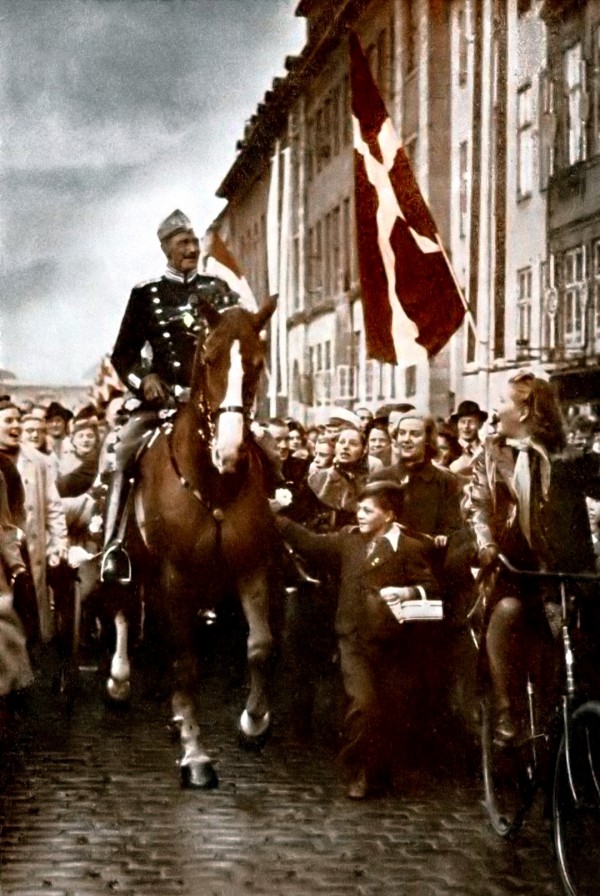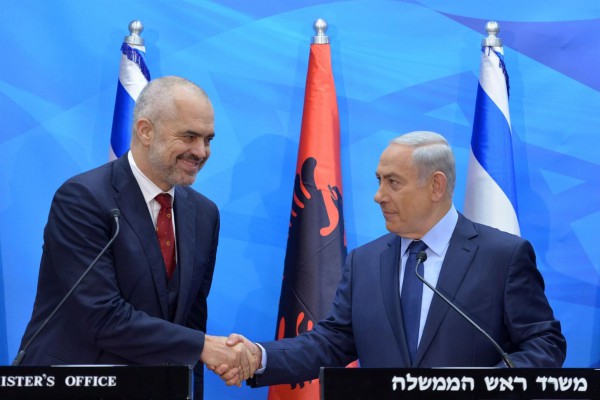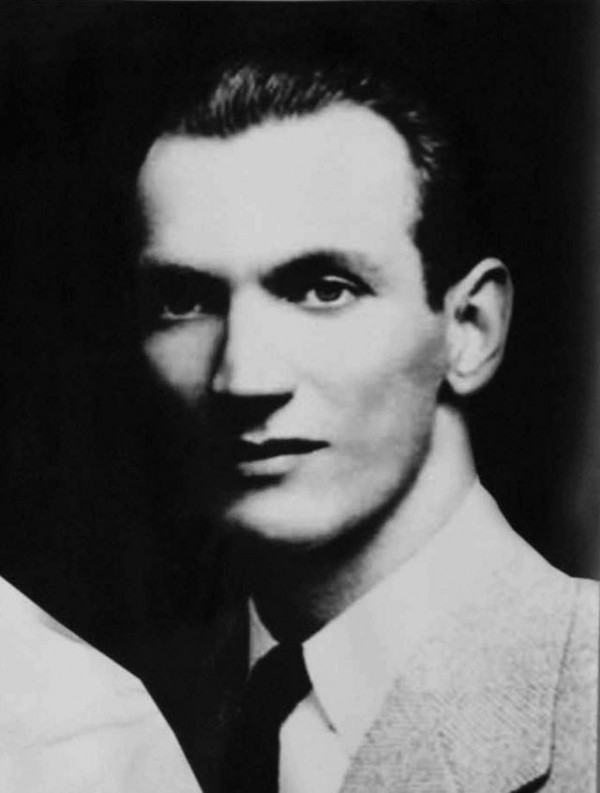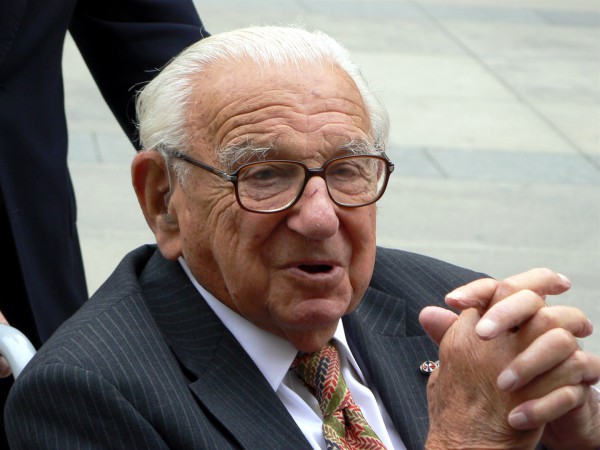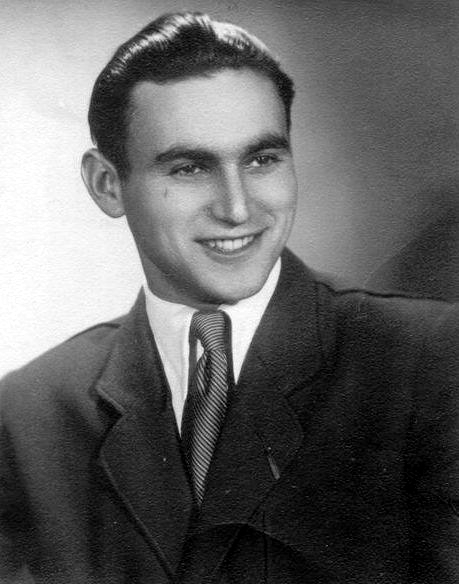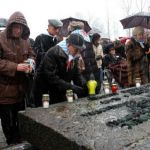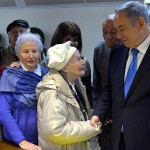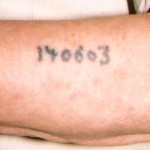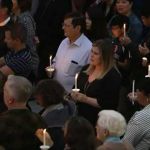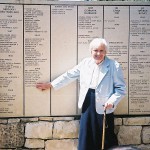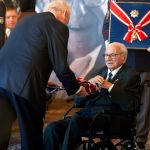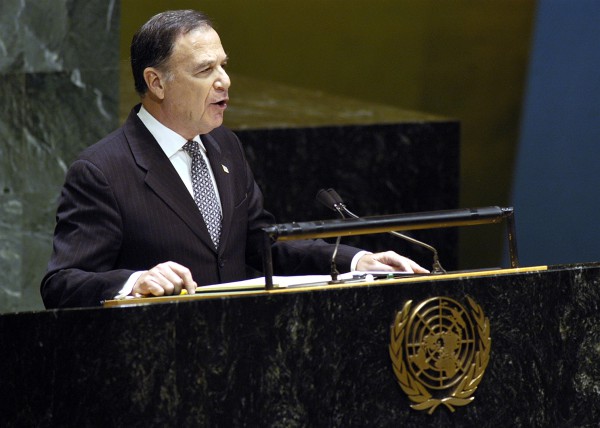
Israel’s representative, Dan Gillerman, at the United Nations speaking at the first International Day of Commemoration in memory of the victims of the Holocaust.
“We know that we are children of God, and that the whole world is under the control of the evil one.” (1 John 5:19)
On January 27, 1945, Soviet troops liberated Auschwitz-Birkenau, the largest Nazi death camp. It is estimated that at least 1.3 million people were deported to Auschwitz between 1940 and 1945. Of those, approximately 1.1 million were murdered.
Just 10 days before the liberation, the Nazis gave the order that all remaining prisoners be killed. As Soviet troops approached, camp inmates were forced on death marches. About 15,000 died in that evacuation. Those who survived the marches were transported to other camps. The Soviets liberated about 7,000 sick and dying inmates at Auschwitz.
Today is the anniversary of that liberation.
The annual commemoration of International Holocaust Remembrance Day on January 27 was an initiative of the State of Israel at the United Nations. Resolution 60/7 was passed in November 2005 and this day now serves as an international warning to the dangers of genocide.
The 60/7 resolution states, “The Holocaust, which resulted in the murder of one third of the Jewish people, along with countless members of other minorities, will forever be a warning to all people of the dangers of hatred, bigotry, racism, and prejudice.”
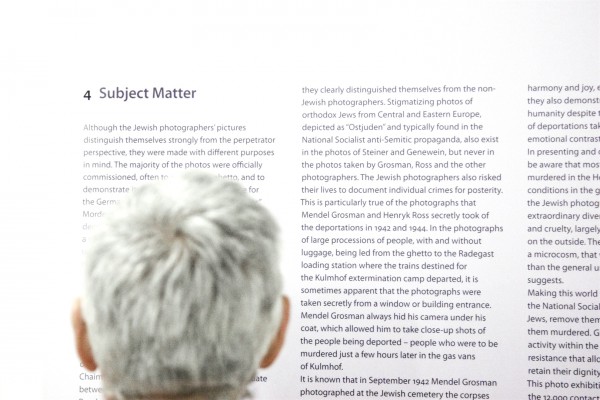
A guest attends the opening of the exhibits, “Monument of Good Deeds: Dreams and Hopes of Children During the Holocaust” and “The Holocaust — Keeping the Memory Alive,” at UN Headquarters. (UN Photo by JC McIlwaine)
Education and Global Justice
“To one who knows the right thing to do and does not do it, to him it is sin.” (James 4:17)
Jewish Holocaust survivors and their children are painfully aware of those who stood by and did nothing in the Holocaust.
One of our staff members commented, “I remember overhearing a Belgium citizen, who was a young man at the time of the Nazi invasion of his land, recalling how he and others had stood idly by as his Jewish neighbors were loaded into trucks and carted off to their destruction.”
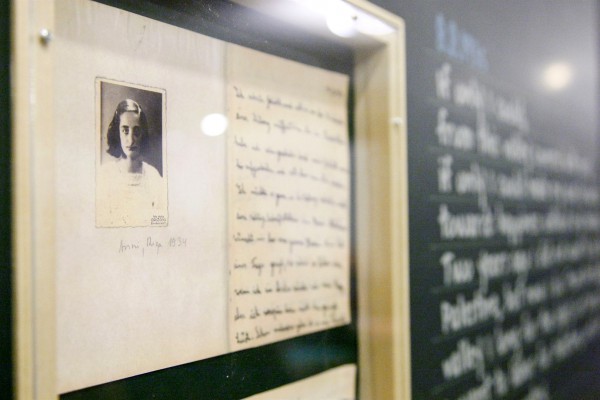
A close-up of a photograph of Anne Frank, part of the exhibit, “Monument of Good Deeds: Dreams and Hopes of Children During the Holocaust,” which opened at the UN Headquarters alongside “The Holocaust — Keeping the Memory Alive.” The exhibits were organized in conjunction with the annual International Day of Commemoration in Memory of the Victims of the Holocaust.
We must never forget those who suffered during the Holocaust!
All genocides, including the Holocaust, can only take root when the local population allows such persecution to take hold. Even though some actually supported and even facilitated policies of persecution, most of the people stood by quietly, not objecting in any way, afraid to speak out, or at worst, simply indifferent to what was happening to their fellowman.
It is these quiet bystanders who enabled the Holocaust, the Nazi persecutions, and the genocide that followed.
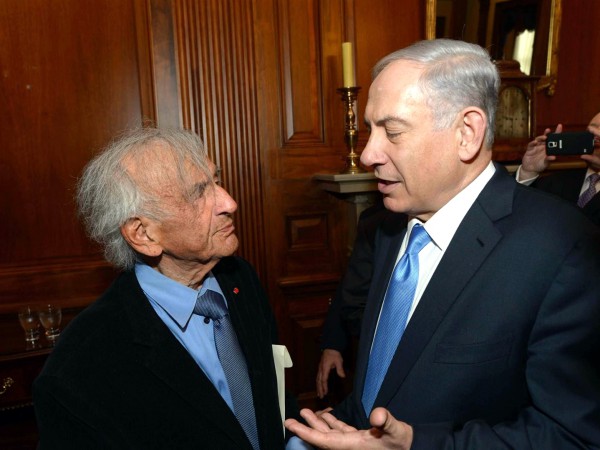
Prime Minister Benjamin Netanyahu meets with Nobel Peace Prize laureate Elie Wiesel. (GPO photo by Amos Ben Gershom)
Holocaust survivor and international author Elie Wiesel in his 1986 Nobel Prize acceptance speech revealed the powerful part that bystanders played:
“I swore never to be silent whenever and wherever human beings endure suffering and humiliation. We must always take sides. Neutrality helps the oppressor, never the victim. Silence encourages the tormentor, never the tormented.” (Nobel Prize)
But, of course, not everyone just stood by.
Denmark did not. A popular myth says that Denmark’s King Christian X wore the yellow star in solidarity with the Jews of his nation.
But, in fact, it seems that the king effectively pushed back efforts by the German occupiers to require Danish Jews to wear the star. This is reflected in his writings:
“When you look at the inhumane treatment of Jews, not only in Germany but occupied countries as well, you start worrying that such a demand might also be put on us, but we must clearly refuse this due to their protection under the Danish constitution. I stated that I could not meet such a demand towards Danish citizens.
“If such a demand is made, we would best meet it by all wearing the Star of David.” (Politiken)
In addition, when the Nazis finally ordered the Jews to be arrested and deported in 1943, the Danish underground movement successfully transported 7,220 of its 7,800 Jewish population to safety in unoccupied Sweden.
In another case of national courage, until the end of 1938, Albania was the only country at the time whose embassy in Berlin issued Visas to Jews.
Moreover, this underdeveloped European nation successfully protected much of its small Jewish population by sheltering Jewish refugees in mountain villages or helping them get passage by boat to Italy.
Israeli Prime Minister Benjamin Netanyahu recognized the bravery of the Albanians during World War II when the Albanian prime minister, Edi Rama, visited Israel.
“I think Albania is the only country whose Jewish population during the Holocaust actually grew because of the refuge and the sanctuary and the friendship and courage shown by the people of Albania,” he said. (JPost)
The story of Corrie Ten Boom and her family as described in her autobiography, The Hiding Place, tells how one Dutch Christian family worked with the Dutch underground during the Nazi occupation of The Netherlands to both hide Jewish families and to help them escape to England.
Corrie and her sister were taken to Ravensbrook concentration camp for their efforts, and their father died in a Dutch transient camp.
Her sister died at Ravensbrook, but Corrie was released just before Christmas due to a clerical error. She spent the rest of her life traveling the world and giving her testimony. She died in Placentia, California at the age of 91 in 1983.
Jan Karski also refused to stand by. This Polish resistance fighter who smuggled himself into the Warsaw Ghetto for a firsthand understanding warned world leaders of the Holocaust as early as 1942.
He brought his message to US president Franklin Roosevelt who showed little interest in the plight of the Jews. He did ask Karski about the horse and cattle population of Poland, though. After speaking with Karski, Roosevelt asked Supreme Court Justice Felix Frankfurter to speak with him as well.
After hearing his report, Karski recalls Frankfurter’s comment: “I do not believe you.” Speaking to the ambassador present, Frankfurter added, “I did not say that he’s lying. I said that I don’t believe him. These are different things.”
Karski, who was Catholic, returned to Poland in the midst of the war to continue fighting for Jewish liberation without the aid of the US.
London stockbroker Nicholas Winton (“Britain’s Schindler”) did on his vacation and personal time what no one else in Europe dared to do: he successfully saved hundreds of Jewish children in the refugee camps of Czechoslovakia by transporting them to Britain. He also wrote to President Roosevelt, requesting to transport the children to the US. Winton recalls, “The Americans wouldn’t take any, which was a pity; we could have got a lot more out.”
While Karski and Winton lived to ripe ages, many of those throughout Europe who risked their very lives to help the Jewish People hide and/or flee to safety, paid the ultimate price, losing their own life or that of family members.
“And so we must know these good people who helped Jews during the Holocaust. We must learn from them, and in gratitude and hope, we must remember them.” (Elie Wiesel)
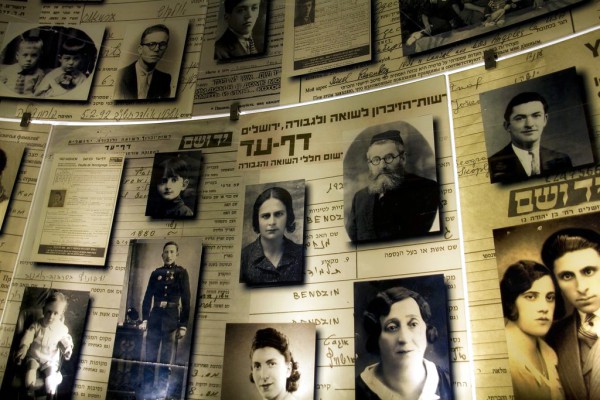
Some of the names and faces memorialized in Yad Vashem’s Hall of Names — the Jewish People’s memorial to each and every Jew who perished in the Holocaust.
Yad Vashem The Holocaust Martyrs’ and Heroes’ Remembrance Authority has on record the names of those who are called the Righteous Among the Nations.
Their website includes a database that can be searched by the name of the Rescuer or by the name of the Rescued Person.
At present there are 27,927 Righteous on record, with Poland alone representing 7,177 — the largest number of any one country. The Netherlands is second with 5,910.
These numbers do not represent the actual total but only those that could be verified by the Authority. (Yad Vashem)
Even the Catholic Church, which contributed to the destruction of European Jewry through its centuries of anti-Semitic teachings and its de facto support of the fascist Hitler government through the signing of a concordant or quasi-diplomatic agreement, saved many Jewish children from certain death by placing them in convents throughout Europe.
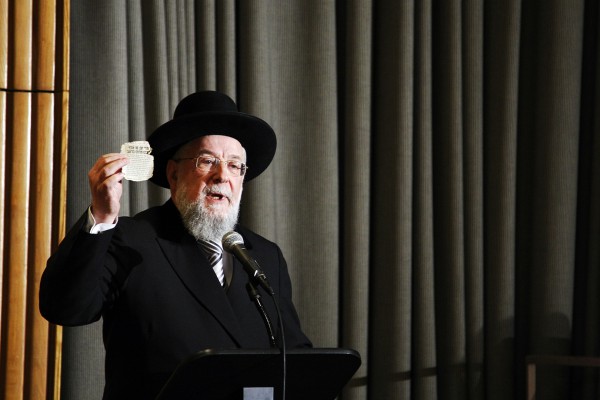
Yisrael Meir Lau, Rabbi and former Chairman of the Yad Vashem Council, addresses a ceremony in observance of the International Day of the Commemoration in memory of the victims of the Holocaust.
The Suffering Souls of Survivors
Many of those rescued still bear the marks of the Holocaust in their souls. A Bibles For Israel team member said,
“As a member of an Ulpan or Hebrew study program at Kibbutz Beit HaShita in the mid 60s, I knew a young woman from Holland, also studying in the Ulpan, whose life had been saved through the efforts of the Catholic Church. As I noticed about others whom I have met over the years who survived the Holocaust, usually after having been interned in death camps, she gave the appearance of one who had suffered from tremendous shock, even decades after the event.”
Some who suffered in the midst of the camps were the most despised, such as the Sonderkommandos, prisoners used by the German SS to do their dirty work.
Typically they would herd condemned victims into the gas chambers, cut their hair, carry out the bodies after the gassings, man the crematoria, sort the cloths, clean out the box cars used to transport victims of bodies and filth, etc.
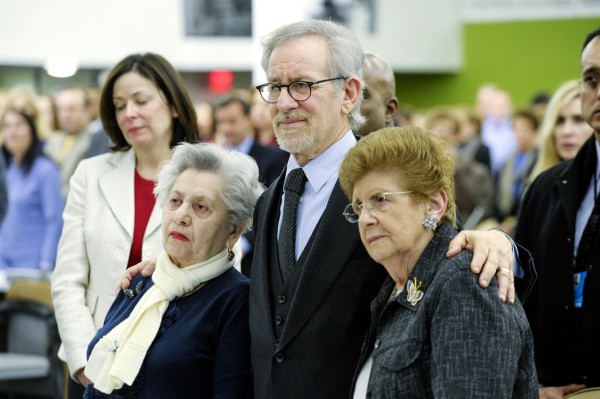
Academy-award winning filmmaker Steven Spielberg (center), stands with Holocaust survivors Fira Stukelman (left) and Rena Finder, as the memorial prayers are recited at the International Day of Commemoration in Memory of the Victims of the Holocaust. (UN Photo by Evan Schneider)
Life expectancy for a Sonderkommando was about four months. Since they had inside knowledge of the crematoria, they were constantly being replaced with others as they themselves were being processed through the killing machine.
A few of them recorded their experiences at the camp on scrolls that they buried in the ground, often among the ashes of victims. One such scroll reads:
“As for us, we have already lost all hope of living to the day of liberation. Despite the fact that joyful news reaches us, we have learned that the world is letting the barbarian destroy the remnants of the Jewish people. …We the Sondercommandos have wanted for a long time to put an end to our terrible labor, forced on us on the pain of death. We wanted to do a great deed.” (Mark, 1988, p. 201, as quoted in “The Unbroken Soul: Tragedy, Trauma, and Human Resilience,” By Henri Parens, p. 56)
Three of these prisoners of death at Auschwitz, Zalman Loewenthal, Zalman Gradowski and Leib Langfus, refused to stand by as they helped to plan a courageous but unsuccessful revolt on October 7, 1944.
Along with other prisoners, they used makeshift hand grenades and set fire to one of the crematoria at Auschwitz. This led to a chaotic outbreak, allowing several hundred prisoners to escape, all of whom were later recaptured and killed.
Rosa Robota, along with four others, sacrificed her life to provide the group with gunpowder that they had smuggled from a munitions factory in which they were forced laborers.
Rudolf Vrba (born Walter Rosenberg), a Czech Jew who managed to escape from Auschwitz on April 7, 1944, returned to Slovakia to warn the Hungarian Jews there that they were being shipped to their deaths.
The Hungarian community leaders, however, disregarded his warning. As a result, the majority of Hungarian Jews who lived in the countryside lost their lives at Auschwitz.
Because news of his report had reached the United States and Europe, pressure was put on Hungary to end the deportations, and about 200,000 Jews in Budapest were saved.
Are We Standing By?
This is a day for everyone to pause and remember the millions whose lives have been taken from them or changed beyond recognition.
This includes not only the victims of the Holocaust and Nazi persecution, but the subsequent genocides in Cambodia, Rwanda, Bosnia, Darfur, Myanmar and other countries. It is a day both to honor the survivors of these catastrophes and to learn from what they experienced to better inform our own lives today.
This is a day for learning the lessons of the past and for realizing that genocide does not just happen; it is the result of a process that occurs over time when growing racism, discrimination, and hatred are left unchallenged and unchecked.
Moreover, it is a day for each of us to check our own heart for passivity in the face of hatred.
“Yeshua said, ‘If you were blind, you would not be guilty of sin; but now that you claim you can see, your guilt remains.’” (John 9:41)
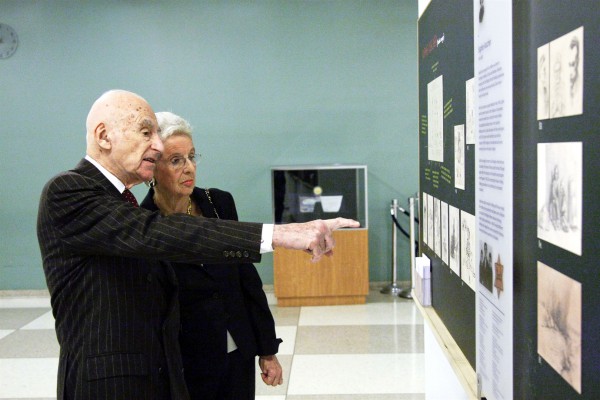
Guests observe documents from the exhibits, “Monument of Good Deeds: Dreams and Hopes of Children During the Holocaust” and “The Holocaust — Keeping the Memory Alive.”
If we claim to follow Yeshua HaMashiach (Jesus the Messiah) and see His truth that others don’t see, we then have a responsibility to not stand by, but reach out with love, hope, and compassion as Yeshua would do.
Discrimination has not ended, nor has the use of the language of hatred towards the Jewish people.
Today the United Nations is once again standing by and doing nothing while Israel fights for its survival. It is vastly outnumbered by by those who hate her. But there is one advantage that has consistently and miraculously tipped the scales in favor of Israel, and always will. The Jewish nation, although small and outnumbered, has a distinct advantage — God is on her side.
“Speak tenderly to Jerusalem, and proclaim to her that her hard service has been completed, that her sin has been paid for, that she has received from the LORD’s hand double for all her sins.” (Isaiah 40:2)




